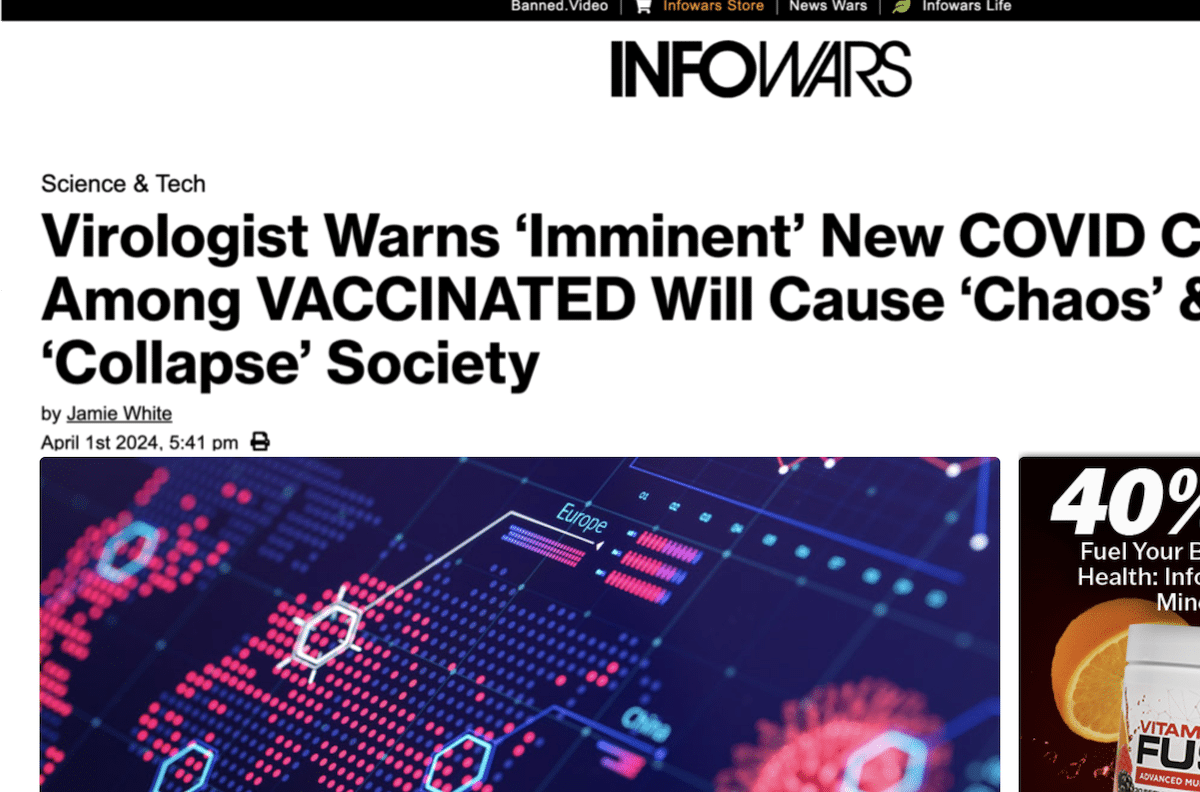- Health
Higher myocarditis risk after COVID-19 than mRNA vaccination; contrary to Peter McCullough’s claim, young persons decrease their risk by getting vaccinated
Key takeaway
Myocarditis, an inflammation in the heart muscle, is typically caused by viral infections. In rare instances, myocarditis can also occur after COVID-19 vaccination. During the global COVID-19 vaccination campaign, the mRNA vaccines have been linked to rare cases of post-vaccine myocarditis that are usually mild and resolve; these have occurred primarily in young males. On the other hand, COVID-19 itself carries a much higher risk of heart complications, including myocarditis. Moreover, the COVID-19 vaccines decrease the risk of COVID-19-related myocarditis, meaning that COVID-19 vaccination continues to be recommended to young persons.
Reviewed content

Verdict:
Claim:
“We have 21,000 cases of myocarditis and climbing. […] Under no circumstances, should a young person ever receive one of these vaccines”
Verdict detail
Lack of context: Myocarditis is an inflammation in the heart muscles. While the mRNA COVID-19 vaccines have been linked to rare, typically mild, cases of post-vaccination myocarditis, COVID-19 itself carries a higher risk of heart complications like myocarditis.
Flawed reasoning: The COVID-19 vaccines protect against severe COVID-19. These vaccines are estimated to decrease the risk of post-COVID-19 myocarditis and myocardial injury 1000-fold, while the mRNA COVID-19 vaccines carry a one to five-fold increased risk of myocarditis in young adults. As such, experts recommend that young people get vaccinated.
Full Claim
“We have 21,000 cases of myocarditis and climbing…that the CDC has verified. 1 was too many. Under no circumstances, should a young person ever receive one of these vaccines, let alone ever be mandated to receive a vaccine”.
Review
Acute myocarditis is an inflammation of the heart muscles (myocardium). Inflammations in this location can impact the heart’s electrical system, causing rapid or irregular heartbeats; they can also weaken the heart muscles, affecting its ability to pump blood. Cases can be mild, resolving on their own, but more severe cases of myocarditis may require hospital care and can even prove fatal.
The typical cause of myocarditis are viral infections, especially those that affect the heart[1]. Throughout the pandemic, studies have found an association between COVID-19, which is caused by the virus SARS-CoV-2, and myocarditis. For instance, an observational study by the U.S. Centers for Disease Control and Prevention (CDC), which analyzed patient data in over 900 US hospitals between March 2020 and January 2021, found that, on average, patients with COVID-19 had a 15.7 times higher risk of having myocarditis compared to those who didn’t have COVID-19[2].
In rare instances, myocarditis can occur after vaccination with certain vaccines, including the mRNA COVID-19 vaccines[3]. Some individuals have used this rare side effect to claim that the COVID-19 vaccines are unsafe, and Health Feedback has previously reviewed inaccurate claims that exaggerated the risk of post-vaccine myocarditis.
An example of such a claim comes from Children’s Health Defense (CHD), an anti-vaccine group helmed by Robert F. Kennedy Jr. On 4 April 2022, CHD posted an image on Instagram, that was later shared on Facebook by social media users, that included a quote about post-vaccine myocarditis by Peter McCullough, a cardiologist whose inaccurate claims about COVID-19 vaccines have been reviewed multiple times by Health Feedback (see here and here).
In the quote, McCullough claimed that the vaccines had caused “21,000 cases of myocarditis and climbing” and, for this reason, “under no circumstances, should a young person ever receive one of these vaccines”. McCullough’s quote comes from a 24 January 2022 event hosted by U.S. State Senator Ron Johnson (Wisconsin).
McCullough did not provide a source for the “21,000 cases of myocarditis” claim. Given the frequent misuse of the VAERS (the Vaccine Adverse Event Reporting System) database in claims surrounding adverse events, it’s likely that the figure came from the VAERS database or other adverse event databases. Health Feedback has previously written about the misinterpretation and misuse of VAERS data (see here, here and here).
While it’s true that studies have found an association between mRNA COVID-19 vaccines and an increased risk of post-vaccine myocarditis, particularly among adolescent males and young men, McCullough ignored the fact that the risk of myocarditis is much higher following COVID-19 infection itself and that most cases of post-vaccine myocarditis are mild and resolve in days or weeks[3,4].
A CDC report from 1 April 2022 found that the risk of heart complications was higher after COVID-19 infection compared to mRNA COVID-19 vaccination[5]. The report analyzed electronic health records of over 15 million persons from 40 U.S. health care systems during 1 January 2021 and 31 January 2022, comparing the risk for cardiac complications, including myocarditis and pericarditis (an inflammation of the tissue that surrounds the heart called the pericardium), following COVID-19 infection and mRNA COVID-19 vaccination. Specifically, the CDC report found that the risk of heart complications was two to six times higher after infection compared to vaccination among teen boys (ages 12 to 17 years) and seven to eight times higher among young men (ages 18 to 29 years).
Not only do COVID-19 vaccines carry a lower risk of myocarditis compared to COVID-19 itself, the ensuing myocarditis is not as severe. Post-vaccine myocarditis is typically mild and carries a lower risk of cardiac complications compared to myocarditis that results from COVID-19.
As mentioned earlier, myocarditis cases vary from mild to severe, but in the rare instances of post-vaccine myocarditis, there has been less variability in terms of severity, as most cases are mild. As Matthew Elias, a cardiologist at the Children’s Hospital of Philadelphia’s (CHOP) Cardiac Center explained: “Overall, this does not seem to be happening in post-vaccine myocarditis. In the patients seen at CHOP and at other hospitals, symptoms are generally mild and self-resolving, and heart function is less affected, if affected at all.”
Because COVID-19 disease carries a higher risk of myocarditis than the COVID-19 vaccines, the vaccines have a favorable risk ratio, meaning they’re more likely to decrease the risk of post-COVID-19 myocarditis[3]. In an article for Nature Reviews Cardiology, Stephane Heymans, a cardiologist at Maastricht University, and Leslie T. Cooper, a cardiologist at the Mayo Clinic in Florida, summarized the overall takeaway from studies so far:
“…With COVID-19 vaccination, the risk of myocardial injury and myocarditis decreases 1,000-fold in the general population, with a minor 1–5-fold increased risk of mild myocarditis in young adults. Therefore, COVID-19 vaccination has an extremely favourable risk ratio for myocarditis and should be recommended in adolescent and adult populations”[3].
As such, McCullough’s claim that “under no circumstances, should a young person ever receive one of these vaccines” is not in line with the recommendations of experts. Both the American Academy of Pediatrics and the American College of Cardiology recommend that children and adults get vaccinated. Even considering the small increase in risk of post-vaccine myocarditis in adolescent males, the American College of Cardiology said in a statement that “the entirety of the protective effect of COVID vaccination, particularly in preventing severe COVID, hospitalization, MIS-C, and death, continues to clearly exceed the risk of VAM [vaccine-associated myocarditis]”.
In short, post-vaccine myocarditis is rare, typically mild and resolves. On the other hand, COVID-19 carries a higher risk of myocarditis and other heart complications, and these myocarditis cases are more severe. Given that the COVID-19 vaccines protect against severe COVID-19 and myocarditis, along with other potentially long-term health problems from COVID-19, the benefits of vaccination outweigh the risks. Therefore experts continue to recommend that young people get vaccinated.
REFERENCES
- 1 – Pollack et al. (2015) Viral myocarditis – diagnosis, treatment options, and current controversies. Nature Reviews Cardiology.
- 2 – Boehmer et al. (2021) Association Between COVID-19 and Myocarditis Using Hospital-Based Administrative Data — United States, March 2020–January 2021. Morbidity and Mortality Weekly Report.
- 3 – Heymans & Cooper (2022) Myocarditis after COVID-19 mRNA vaccination: clinical observations and potential mechanisms. Nature Reviews Cardiology.
- 4 – Oster et al. (2022) Myocarditis cases reported after mRNA-based COVID-19 vaccination in the US from December 2020 to August 2021. JAMA.
- 5 – Block et al. (2022) Cardiac Complications After SARS-CoV-2 Infection and mRNA COVID-19 Vaccination — PCORnet, United States, January 2021–January 2022. Morbidity and Mortality Weekly Report.



